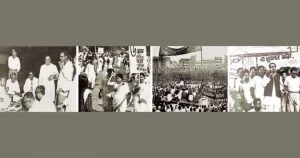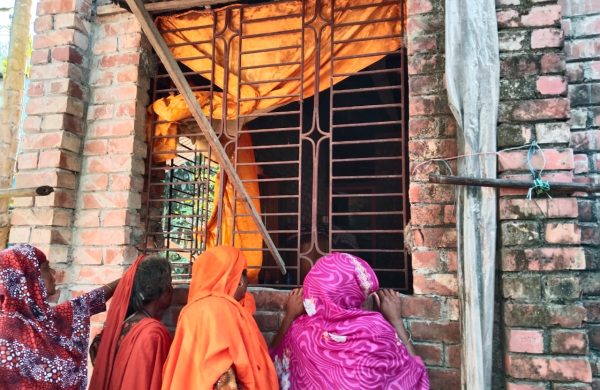1949—2024: Those Awami League moments…
- Update Time : Sunday, June 23, 2024

—Syed Badrul Ahsan—
Seventy-five years after June 1949, it is the defining moments in the history of the Awami League which call for study. The oldest political party in Bangladesh, the Awami League is synonymous with the history of the country, having played a pivotal role in all the major happenings which have reconfigured politics in our part of the world.

File Photos
On 23 June 1949, the emergence of the Awami Muslim League was a loud message sent out to the two regions of Pakistan that politics was at risk in the hands of the ruling Muslim League, that the new party was therefore an instrument which would check the unbridled authority of the men who had entrenched themselves in power following the partition of India in August 1947.
The power of the Awami Muslim League to draw people to its democratic politics was made manifest when, as the major party in the Jukto (United) Front, it displaced the Muslim League at the provincial elections in East Bengal in March 1954. Conspiracy shaped in distant Karachi brought down the Fazlul Huq-led ministry in Dhaka, but what came through with clarity was the assertive presence of the party, despite its removal from office, as it was then led by Moulana Abdul Hamid Khan Bhashani.
Every Awami League moment has been a step toward an assertion of popular aspirations for democracy as also the general urge of Pakistan’s Bengalis for politics based on secular principles. It was such a moment which in the mid-1950s transformed the Awami Muslim League into the Awami League, disseminating the idea that Pakistan’s Muslim identity notwithstanding, the Bengalis of the state were unwilling to sacrifice their heritage at the questionable altar of communalism. The Awami League would be the symbol of Bengali secular politics.
The Awami League, it certainly will not do to forget, was always a thorn in the side for Pakistan’s entrenched civil-military bureaucratic complex. The consequences were predictable: it was perennially the Awami League which bore the brunt of state repression, effectively beginning with the imposition of martial law in October 1958. The young firebrand Sheikh Mujibur Rahman was the first victim of the regime and so was carted off to prison. Some years later, with Mujib stepping into and out of prison, the Ayub Khan regime placed Huseyn Shaheed Suhrawardy, one of the key figures of the Awami League, in jail.
The Awami League did not genuflect before all this demonstration of brutal force by the regime and its collaborators. As part of the National Democratic Front in the 1960s, it loudly voiced the demand for a restoration of political pluralism in the country. Moving the party out of the NDF in early 1964, Sheikh Mujibur Rahman, the rising spokesperson of the Awami League, went full length into the presidential campaign of Fatima Jinnah at the election slated for January 1965. The Ayub regime rigged the election to steal a victory, but that the Awami League was becoming increasingly irrepressible as a political force was a thought not lost on anyone.
Where the general run of politics was characterised by the propensity of political parties to compromise and accommodate themselves within the structure dominated by the military, as epitomised by the Ayub dictatorship, the Awami League branched out on a new and necessarily independent path for itself. Gravely concerned about the exploitation of East Bengal by the industrial complex based in West Pakistan, Sheikh Mujibur Rahman and his party colleagues knew the time for radical action was at hand.
On 5 February 1966 in Lahore, where twenty-six years earlier the Muslim League had adopted the so-called Pakistan Resolution, Sheikh Mujibur Rahman let it be known that politics was about to go through a sea change. His Six Points, calling for broad regional autonomy for East Bengal, electrified his fellow Bengalis and threatened the forces of exploitation in West Pakistan with the coming loss of their privileges and dominance of society.
The Six Points were a golden moment for the Awami League. Enough was enough … that was the message the party conveyed to the establishment in Rawalpindi. That Bengalis had found a voice in Sheikh Mujibur Rahman, that the Awami League was the vehicle that would carry Bengali aspirations to fruition in course of time, came through with clarity in February 1966.
No degree of repression, as was inflicted on the Bengali nation in the course of the 7 June 1966 hartal called by the party in support of the Six Points, could beat back the rising crescendo of Bengali demands for an end to economic exploitation and political deprivation in the province.
A new Awami League moment came once the Agartala Case had been withdrawn unconditionally in February 1969 and Sheikh Mujibur Rahman, anointed by a grateful nation as Bangabandhu, travelled in triumph to Rawalpindi, to be greeted by his long-time tormentor Ayub Khan, and boldly placed his Six Points at the round table conference.
It was a moment unparalleled in history, for it raised Bangabandhu to the position of Bengal’s sole spokesperson in Pakistan’s politics. The election of December 1970 formalised the position, placing Bangabandhu in the position of Pakistan’s very first elected leader poised to take over as the country’s Prime Minister.
A crucial Awami League moment came through the formation of the very first independent Bengali government at Mujibnagar in April 1971 by Tajuddin Ahmad and other associates of Bangabandhu in the aftermath of the genocidal crackdown by the Pakistan army in occupied Bangladesh in March. The Awami League, having espoused for decades the principle of constitutional politics, now bravely went into the onerous task of shaping guerrilla strategy against a marauding alien army.
And then came the moment when the Awami League returned home in triumph in December 1971 once the enemy had been vanquished on the battlefield and the sovereign republic of Bangladesh rose through a tortuous War of Liberation.
A brilliant Awami League moment was encapsulated through the homecoming of Bangabandhu Sheikh Mujibur Rahman in January 1972 from incarceration in Pakistan. It was a moment when freedom was consolidated, when the light of liberty shone all across the land. The country would be safe and secure in Bangabandhu’s hands.
On 12 June 1996, the Awami League broke through the darkness the nation had been pushed into over the preceding twenty-one years by agents of anti-history eating away at the fundamentals of the Bangladesh nation-state. It returned to power with Sheikh Hasina as its leader and set about righting the many wrongs which had kept the nation in a straitjacket under dictatorial rule in the aftermath of the tragic happenings of August 1975.
The Awami League is part of this nation’s history. It corrected in 1971 the grievous wrong perpetrated through the break-up of the subcontinent in 1947. It served as the ceaseless voice of democracy in the twenty-four years Bangladesh remained the eastern province of Pakistan. It guided the Bengali nation to freedom in 1971, gave Bangladesh a constitution in 1972 and set about shaping the administrative and political structure of the country.
Along the way, it has paid a heavy price. Its leaders and workers fell prey to genocide in 1971. Following liberation, a number of its lawmakers succumbed to assassination carried out by underground elements. Bangabandhu Sheikh Mujibur Rahman was assassinated with almost his entire family in 1975, tragedy which soon was followed by the murder in prison of the four leading lights of the 1971 Mujibnagar government. Ivy Rahman died in a grenade attack; Shah AMS Kibria and Ahsanullah Master fell to assassins’ bullets.
And yet the Awami League has survived. Its roots remain deep; its legacy has never been erased; and its future depends on the sagacity its current leadership can bring to bear on its ability to articulate popular aspirations in the country.
These past seven decades and five years have been a constant strengthening of the bonding between the Awami League and the people of Bangladesh. The bonds will not snap or weaken if the moral undertaking on the part of the party leadership remains the assurance and practice of good, purposeful governance based on the rule of law.
The party will need to crack down harshly on corruption within itself and without. It must convince the nation it is yet the big tent Bangabandhu Sheikh Mujibur Rahman gave shape to in his times. The nation will require convincing that the Awami League remains the dream machine which Tajuddin Ahmad, Syed Nazrul Islam, M Mansoor Ali and AHM Kamruzzaman once conceived it to be.
(Syed Badrul Ahsan writes on politics, diplomacy and history)



















